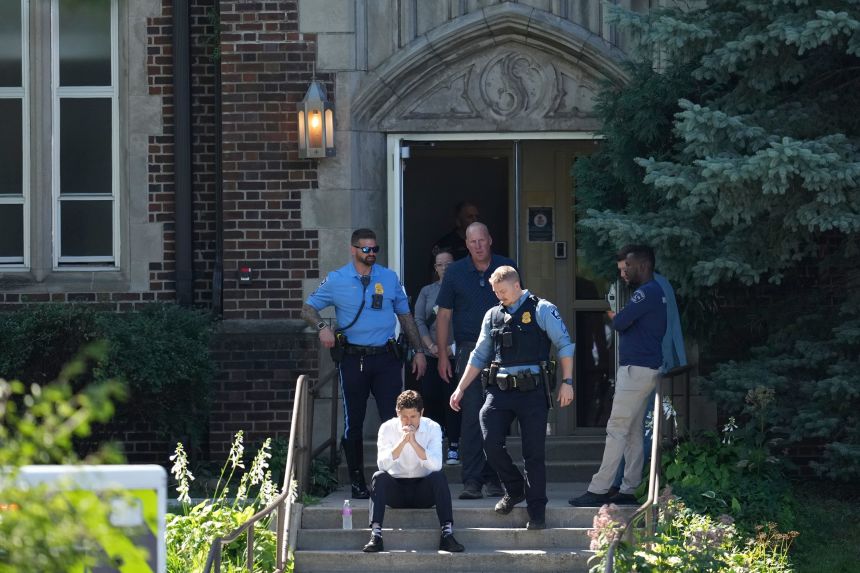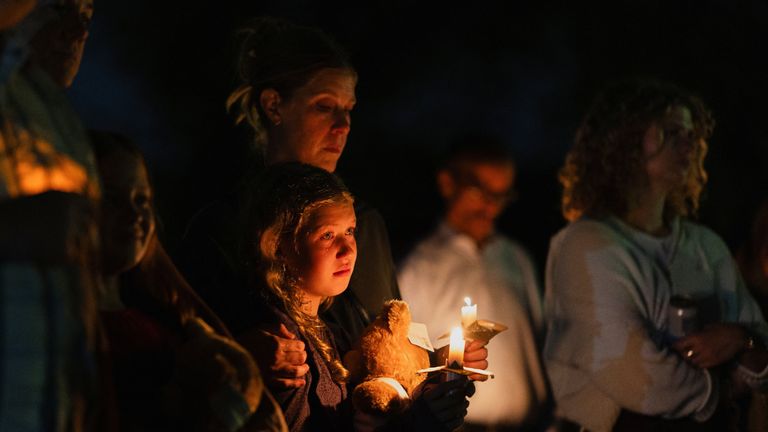Table of Contents
Introduction: Minneapolis Mayor Calls for Assault Rifle Ban
Minneapolis mayor calls for assault rifle ban following a tragic shooting at Annunciation Catholic School in August 2025. The deadly attack killed two children, injured 17 others, and left the community traumatized. This heartbreaking incident reignited the national debate on gun violence, school safety, and the role of assault-style weapons in America.
Mayor Jacob Frey’s strong call for action has become a defining moment in the gun control debate. This article provides the ground reality of the shooting, the mayor’s response, political reactions, and the future of gun laws in the U.S.
The Deadly Catholic School Shooting in Minneapolis
The tragedy unfolded on August 27, 2025, during a morning Mass at Annunciation Catholic School in south Minneapolis. Witnesses described chaos and horror as the gunman opened fire from outside the building.
Key Details of the Attack:
- Victims: Two children, ages 8 and 10, were killed.
- Injured: 17 people, including 14 children and 3 elderly parishioners.
- Shooter: Identified as 23-year-old Robin Westman, who later died by suicide.
- Weapons Used: A legally purchased assault-style rifle, shotgun, and handgun.
- Possible Motive: Anti-Catholic hate messaging and extremist writings found in the shooter’s belongings.
The incident is now being investigated by the FBI as both a hate crime and an act of domestic terrorism.
Minneapolis Mayor Calls for Assault Rifle Ban – Jacob Frey’s Statement
At a press conference shortly after the attack, Minneapolis mayor calls for assault rifle ban became the headline nationwide. Mayor Jacob Frey delivered an emotional yet firm statement:
“This is about guns. Assault-style weapons should not be in the hands of civilians. They belong only in the hands of trained military and law enforcement. No parent should fear sending their child to school.”
Core Points from the Mayor’s Appeal:
- Immediate ban on assault-style rifles at both state and federal levels.
- Stronger mental health screenings before firearm purchases.
- Action must go beyond thoughts and prayers to real policy changes.
- Protecting children and schools should be the top priority.
Mayor Frey’s words struck a chord with grieving families and reignited debates across the country.
Ground Reality: Gun Violence in Minneapolis and the U.S.
The ground reality is that gun violence remains one of America’s most pressing issues. According to gun violence trackers:
- Over 400 mass shootings occurred in the U.S. in 2025.
- Assault rifles were used in a majority of school shootings.
- Minnesota itself has seen a sharp rise in gun-related crimes over the past decade.
Experts argue that while no law can eliminate violence entirely, limiting access to assault-style weapons could drastically reduce the scale of casualties.

Community Response After the Catholic School Attack
For the people of Minneapolis, the tragedy left deep emotional scars.
- Vigils & Memorials: Hundreds gathered at Annunciation Catholic Church for prayer vigils.
- Support Services: Counseling centers reported an influx of children and parents suffering trauma.
- Parents’ Voices: Many parents demanded that lawmakers prioritize school safety and gun reform over partisan politics.
The ground reality is clear: families are grieving, survivors are traumatized, and children are afraid to return to school.
Political Reactions: A Divided Nation
The fact that the Minneapolis mayor calls for assault rifle ban has stirred reactions from political leaders nationwide:
- Supporters: Senator Amy Klobuchar and other Democrats backed the mayor’s call, demanding a revival of the federal assault weapons ban (originally enacted in 1994 but expired in 2004).
- Opponents: Gun rights advocates and some Republican leaders argue that bans violate the Second Amendment and punish law-abiding citizens.
- Federal Investigators: The FBI is pursuing the case as a hate crime and domestic terrorism, which could influence future legislation.
This tragedy highlights how deeply divided America remains on the issue of guns.
Impact of Minneapolis Mayor’s Call on the Gun Control Debate
The fact that the Minneapolis mayor calls for assault rifle ban could have far-reaching effects:
- State-Level Push: Minnesota lawmakers are now under pressure to pass stricter regulations.
- Federal Debate: The tragedy has reignited calls in Congress for a nationwide ban on assault rifles.
- Public Opinion: Polls show a rising majority of Americans now support bans on high-capacity assault weapons.
Still, strong opposition from lobbying groups like the NRA makes passing such laws a major challenge.
Challenges in Enforcing an Assault Rifle Ban
Even if laws are passed, several obstacles remain:
- Millions of assault rifles already in circulation across the U.S.
- Legal battles over Second Amendment rights.
- State-by-state differences in enforcement.
- Resistance from powerful gun lobbies.
The ground reality is that change will not be immediate—it will require persistence, legislation, and cultural shifts.
Psychological Impact: Survivors and Families
Beyond the political arguments, the true impact is felt by the children, teachers, and families affected:
- Students face PTSD, nightmares, and anxiety about attending school.
- Parents live with constant fear and grief.
- Teachers & Staff deal with trauma and survivor’s guilt.
Experts believe long-term mental health support will be essential to help survivors heal.
Comparisons: How Other Countries Handled Assault Rifle Bans
Looking globally, other nations that faced similar tragedies took bold steps:
- Australia (1996): A mass shooting led to a complete ban on semi-automatic weapons, with a buyback program. Mass shootings dropped dramatically afterward.
- United Kingdom: Strict gun laws prevent most civilian access to assault rifles. School shootings are almost nonexistent.
- Canada: Recently banned assault-style rifles nationwide after deadly shootings.
These examples show that bans can reduce mass violence—but only with enforcement and public support.
Future Implications of the Mayor’s Call
If the Minneapolis mayor calls for assault rifle ban movement gains traction, it could:
- Inspire other mayors and governors to push for similar bans.
- Influence the 2026 election debates on gun policy.
- Mark a turning point in U.S. gun control laws if enough bipartisan support emerges.
The coming months will determine whether this tragedy sparks real change or fades into political gridlock.
FAQs: Minneapolis Mayor Calls for Assault Rifle Ban
Q1: Why did the Minneapolis mayor call for an assault rifle ban?
Mayor Jacob Frey made the call after the Catholic school shooting, saying such weapons are too dangerous for civilians.
Q2: How many victims were there in the Catholic school attack?
Two children were killed and at least 17 others were injured.
Q3: What weapons did the shooter use?
The shooter used multiple firearms, including a legally purchased assault-style rifle.
Q4: Will the U.S. pass an assault rifle ban?
It remains uncertain due to strong political opposition, but momentum for stricter gun laws is growing.
Q5: How did the community react?
Vigils, prayers, and public calls for gun reform have been central to the community’s healing process.
Conclusion: Minneapolis Mayor Calls for Assault Rifle Ban – A Nation at a Crossroads
The tragic Catholic school shooting has once again exposed America’s painful struggle with gun violence and school safety. The fact that the Minneapolis mayor calls for assault rifle ban shows growing frustration with political inaction.
For families mourning their children, for students coping with trauma, and for communities living in fear, the ground reality is heartbreaking. Whether this tragedy becomes a turning point for meaningful reform or another missed opportunity depends on the choices America makes now.
